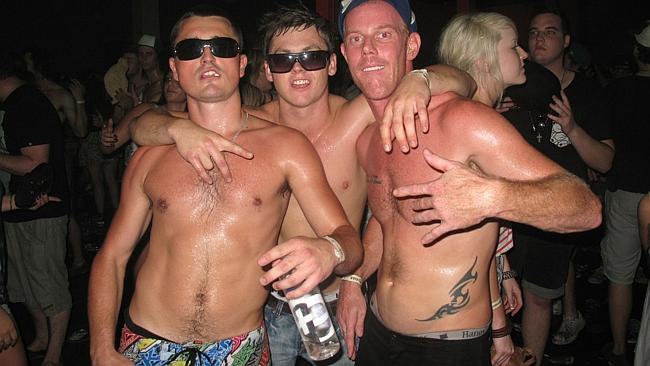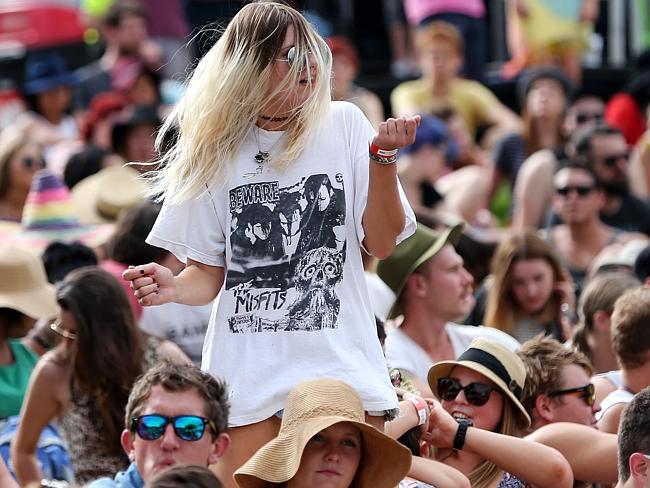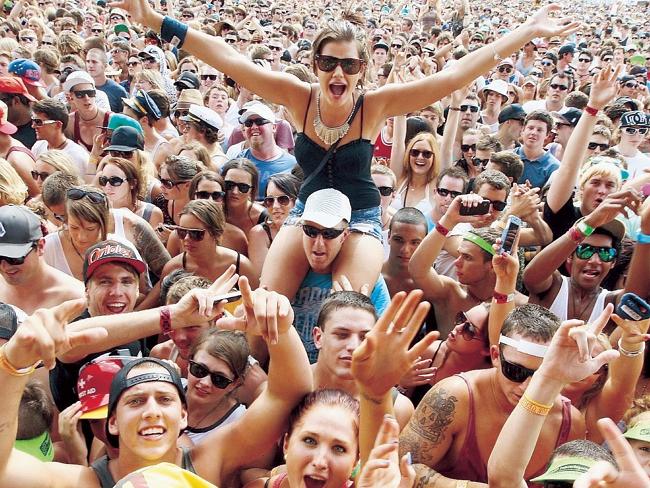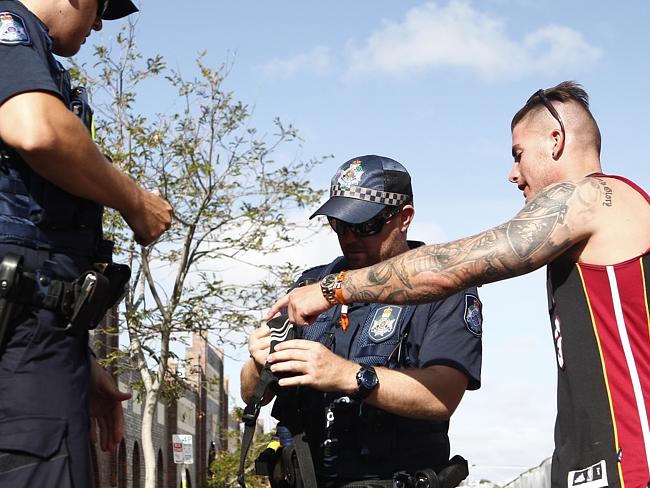Hell-fests ditched for micro-parties

Sweaty shirtlessness is so 2009.
Source: Supplied
LIVE music events are back in the firing line after a woman was indecently assaulted at a Melbourne festival this week.
The shocking incident, in which a man ejaculated on the 20-year-old as she watched hip-hop act Thundamentals, comes as experts call for pill-testing at Australian dance parties.
MORE: Man indecently assaults woman at Melbourne music festival
MORE: Thundamentals say they are ‘shocked and disgusted’ at assault
It follows the death of Georgina Bartter, who reportedly took ecstasy at Sydney’s Harbourlife festival, and that of a 19-year-old man at the city’s A State Of Trance festival. Police are investigating claims he was competing with a friend, who was left in a critical condition, to see who could take more drugs.

Laneway Festival is typical of a new type of boutique event.
Source: News Corp Australia
These disturbing stories only serve to bolster the perception of Aussie festivals as magnets for drunk, drug-addled, violent youth — and it’s leading some to give them a wide berth.
A brawl at Stereosonic in December compelled co-founder Frank Cotela to post a Facebook message criticising the “’roided up bros” whose violent “muscle culture” is spoiling major events.
It has seen several festivals, including Future Music’s under-18s sister event Good Life, place a ban on shirtlessness.
And with a number of events cancelled last year after struggling to sell tickets, is the Australian music festival losing its shine? Even festival behemoth Big Day Out is taking a year off, perhaps to decide what it can offer the punters sick of ageing rock acts and loutish behaviour.
“I used to be a huge festival-goer, and I found myself at Parklife in Sydney a few years ago,” Kim Wilmot told news.com.au. “It had been raining on and off all day, and around me people were rolling about in the mud. Lots of kids had made a point of advertising how ‘munted’ they were by writing so on their arms and clothes.
Today’s festival-goers are tired of ‘munted’ boasts.
Music fans want more.
“About 10 minutes into the headline act on the main stage my friend next to me squealed, I thought she’d been hurt. She had a look of pure horror on her face. At the same time I felt something warm and wet on my back. We both turned at the same time to find a guy with his penis out, staggering around and urinating on anyone who got in his way.
“We looked for help but most people in the crowd (who weren’t being urinated on) thought it was hilarious. We left early — it was a horrible end to a terrible festival and I’ve never been to one since.”
Robert Wright said his Stereosonic visit was, “nothing but steroid fuelled ‘straight’ men wearing Speedos and grinding on each other’s shoulders”, while Sarah Woodland was confronted with “Middle-aged drunk Metallica fans at Soundwave” trying to pick a fight over her Linkin Park T-shirt.
Tish Magee described a man jumping from a fence on top of her at Soundwave in Adelaide in 2012, while other negative experiences ranged from disgusting toilets to being punched without reason to seeing men trying to sexually assault a young woman in a mosh pit.
Some music fans said they wouldn’t even go to festivals, because they only expected “drunk morons” and sweating crowds. But are they really that bad?

Big Day Out was among the festivals cancelled this year.
Source: Supplied
Jonathan, a 19-year-old student, told news.com.au that while he used to believe that Sterosonic was a “bogan fest”, but later discovered that the “gym junkie stereotype” wasn’t the whole story.
“On the other side is the normal cool fun-loving kids who just wanna go for the experience, who block out the attention seekers and their horrid dancing to be swept up in Aviici’s Hey Brother.”
Kat Harris is about to go to her sixth Soundwave and says she has never had a bad experience. “The only issue is expensive food and half strength drinks. Always the best day, listening to bands perform and surrounded by thousands of people who just want to have a good time.”
Marie Louise thought the same way. “I love Aussie festivals. We can listen to great DJs, dance in the sun, drink beer and spend time with our friends.”
Darren Levin, editor of Australian music website Faster Louder, says Australia actually adheres to high standards, and most events are very safe and professionally run considering the number of attendees and presence of alcohol. St Kilda festival, where the woman was indecently assaulted, was not a ticketed event.
“There’s a shifting demographic,” he adds. “The market is so saturated it can be hard to get big-name acts. Before, you had these arena bands touring, but now it’s hard to get the same top bands if they toured last year.

Experts say Australian music festivals are generally safe and well-run.
Source: News Corp Australia
“People want more boutique, niche experiences. It’s not about huge gatherings of the tribe any more. The BDO model doesn’t reflect how people consume music now.”
He says festival-goers want to attend an “experiential” event, perhaps with great food, movies, performance art or camping. The enormously popular Laneway — which has been exported to Singapore and Detroit — marks a very different festival to those of old.
Falls and Splendour in the Grass are part of this new breed of festivals, while a quick survey of music fans draws out eclectic names including Field Day, Sydney Country Music Festival, Woodford Folk festival, Sunfest (a seventies revival) and Blues at Bridgetown.
Jonathan May said he and his family do a 16-hour round trip to Toowoomba for Easterfest each year, where they feel “safe and at ease”.
Levin thinks “smaller is better”, and is excited by the emergence of these micro-festivals. “People are enjoying having more freedom, to not wait in line, there’s not so much reliance on huge acts, and a more varied bill, with niche acts.
“I don’t think it’s all doom and gloom. It’s just changing.”
Ageing rock bands are making way for smaller acts.









